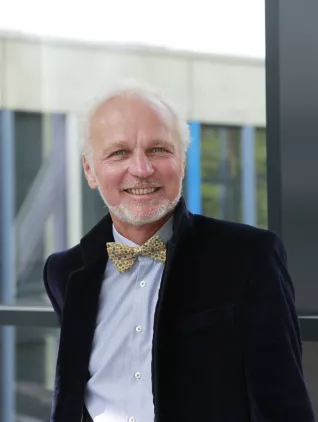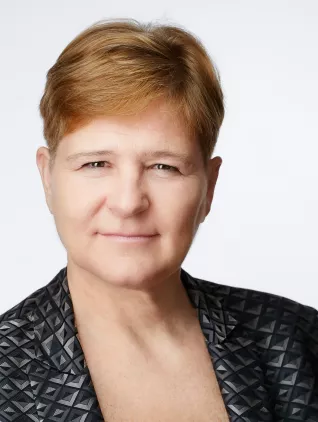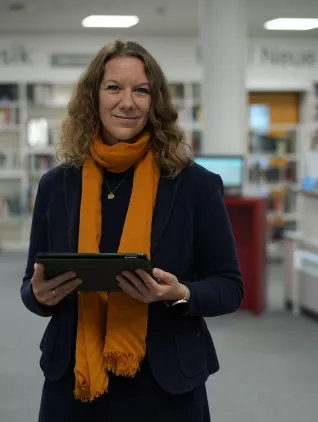Vice President International Affairs and Digital Transformation (VP3)
World Politics on Campus
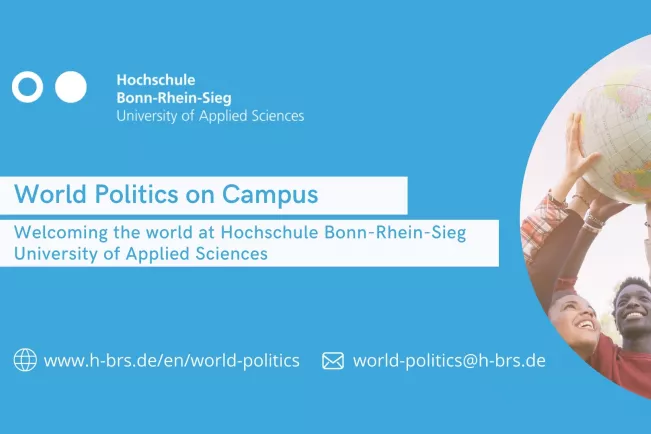
World Politics on Campus
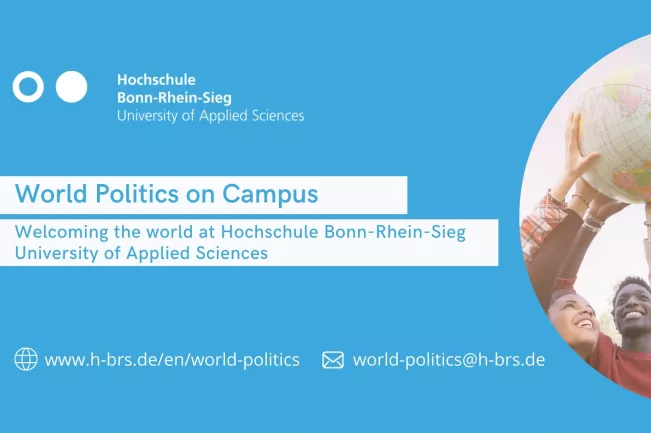
The "Western" model of policy, governance and economy is increasingly being challenged. With China, a new power is rising. Alternative models to the Western democracy claim to deal more effectively with new developments and mega-trends. Climate change and pollution require drastic and immediate measures. The war in Ukraine challenges not only the West but the existing global governance structures and our understanding of international rules. The new governance system in Afghanistan lead to the evaluation of interventions that miss long term political focus und agreed international understanding on its political objectives.
Populations in privileged countries fear global migration. The fairness of the distribution of income and wealth in the world is questioned. Populist political figures are gaining ground, and multi-lateral institutions are being discredited.
Over the last decades, globalization has impacted the entire world. Many industries profited from globalization, and companies of all sizes have become extremely active on the international stage. Globalization has created growth, jobs and financial strength, and has allowed us to invest in future technologies. Even though it is unimaginable to significantly scale back the degree of globalization, the world is struggling to find solutions for its detrimental effects. The pandemic yet has shown also shrinking international trade relations and intertwined dependencies around the globe.
The lecture series World Politics on Campus – Welcoming the world at Hochschule Bonn-Rhein-Sieg University of Applied Sciences provides insights into the challenges lying ahead of us. It attempts to shed light on the issues from more than one standpoint. We invite outstanding and distinguished international personalities, experts and decision-makers who are able to introduce the audience to the views of the nations and cultures they represent. Participants will be able to engage in conversation, ask questions and enter discussion.
If you wish to be informed about upcoming events, we are happy to add your to our mailing list. Please send an email to world-politics@h-brs.de for this purpose.
16 Nov 2023: Power shift? The key results of India's G 20 Presidency
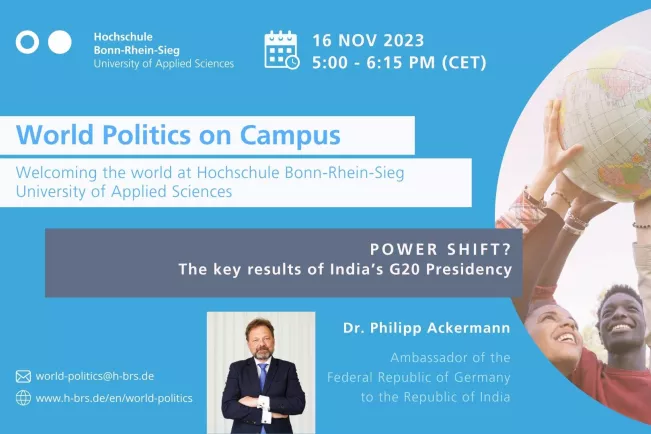
Keynote Speaker: Dr. Philipp Ackermann, Ambassador of the Federal Republic of Germany to the Republic of India
When the leaders of the twenty largest economies met for the first time in 2009 for the G20 summit, the focus was on overcoming the financial crisis. Today, the G20 has become one of the most important multilateral coordination formats for a wide range of globally relevant issues.
India took over the presidency of the G20 for the first time in 2023. This presidency comes at a time of geopolitical upheaval and friction, with the war in Ukraine being just one of the challenges. Developing economies are demanding better representation and consideration of their interests in global governance structures. They want a redistribution of power and influence in favor of their countries and populations. They are becoming increasingly self-confident in the face of their economic growth. At the same time, the interests are by no means always aligned.
In this situation, has India managed to achieve results that extend beyond the day, balance the different interests and move the world forward?"
Dr. Philipp Ackermann serves as Ambassador of the Federal Republic of Germany to the Republic of India.
He studied art history, modern history and economics in Bonn, Heidelberg and Utrecht. He received his doctorate in art history in 1993. In the same year, he joined the Foreign Service. His assignments abroad took him to Rabat (Morocco) and New York (German Mission to the United Nations), among other places. In 2006/07, he was the civilian head of the Provincial Reconstruction Team in Kunduz/Afghanistan. From 2007 to 2010, he served as Political Counsellor in New Delhi/India. He was posted to Washington in 2014-2106 as Permanent Representative of the Ambassador.
From 2002 to 2006, he worked in the Minister's Office of the Foreign Office for Joschka Fischer and then for Frank-Walter Steinmeier. From 2010 to 2014, he was also Deputy Special Representative of the Federal Government for Afghanistan and Pakistan as Head of the Afghanistan-Pakistan Working Staff. Prior to his current assignment, he worked for five years as Head of the Political Division for Africa, Latin America, Near and Middle East at the Federal Foreign Office in Berlin.
On 16 Nov 2023, Dr. Philipp Ackermann will hold a keynote on "Power shift? The key results of India's G 20 Presidency".
The online talk and discussion will be moderated by Prof. Dr. Claudia Warning.
1 Dec 2022: Dealing with multiple global crisis - the role of the World Bank and how it has to evolve
Keynote Speaker: Michael Krake, Executive Director for Germany, World Bank Group, USA
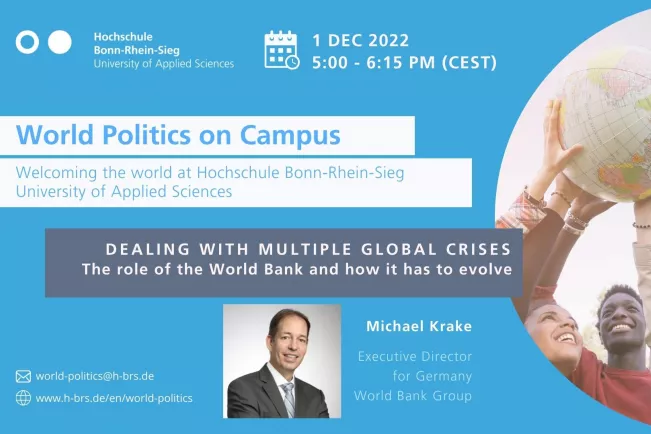
Today the biggest challenges in our world go beyond borders and pose existential risks for our societies – climate change, pandemics, loss of biodiversity, fragility and others affect all of us, but especially the poorest and most vulnerables.
Yet, multilateral institutions like the World Bank were not designed to address these challenges. The World Bank is now confronted with new demands like unprecedented crisis response and protecting global public goods. At the same time, traditional development challenges like eradicating hunger and poverty remain. The World Bank needs to put green, resilient and inclusive development at the core of its mandate. Easier said than done…
Michael Krake serves as the World Bank Group Executive Director for Germany since April 2022. Prior to joining the WBG Board, Mr. Krake held leadership positions in the German Federal Ministry for Economic Cooperation and Development (BMZ) as Deputy Director-General for Sustainable Supply Chains, Food and Rural Development; Director-General for Global Health, Private Sector, Trade and Rural Development; and Deputy Director-General for Private Sector, Trade, Employment and Digital Technologies.
He also served as BMZ’s main focal point for cooperation with the International Labour Organization and the United Nations Industrial Development Organization. Mr. Krake spearheaded the team for Germany’s contribution to the WBG’s World Development Reports from 2019 to 2021. He is a seasoned economist specialized in international cooperation and development with over 20 years of experience in public policy, diplomacy, and the private sector. Mr. Krake serves on the Committee on Development Effectiveness (CODE) and is a member of the Budget Committee (BC).
On 1 Dec 2022, Michael Krake will hold a keynote on "Dealing with multiple global crises – the role of the World Bank and how it has to evolve".
6 Oct 2022: Global food crisis. Why and what to do?
Keynote Speaker: Dr. Stefan Schmitz, Executive Director, Global Crop Diversity Trust, Germany
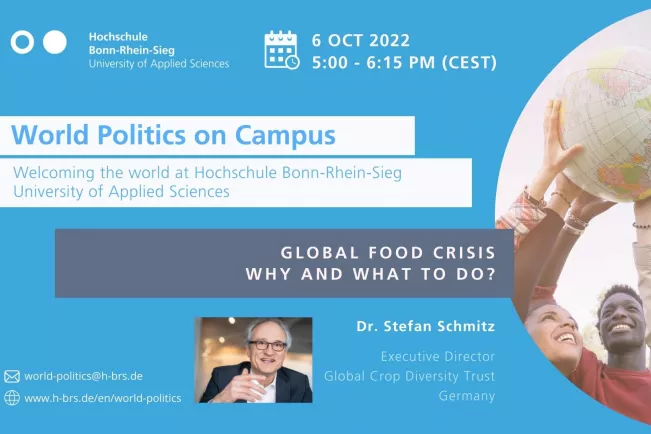
The war in Ukraine has highlighted the vulnerability of our global food system. The war reveals how much the food security of a growing world population is threatened. In addition to strengthening urgently needed emergency food aid, the deeper structural causes of the food crisis must be addressed. For example, among the many approaches needed to strengthen the resilience and sustainability of the food system are greater diversification of food markets and greater conservation and use of agricultural biodiversity.
Dr. Stefan Schmitz is the Executive Director of the Global Crop Diversity Trust (Crop Trust) based in Bonn. Prior to joining the Crop Trust in 2020, he was Chair of the Steering Committee of the Global Agriculture and Food Security Program (GAFSP), coordinated by the World Bank, and spent 20 years at the German Federal Ministry for Economic Cooperation and Development (BMZ) in various capacities, most recently as Deputy Director-General for food, agriculture and rural resources. He studied geography and mathematics in Bonn and St. Andrews and received a PhD in applied geography from the Free University of Berlin.
2 Jun 2022: Emergency relief in political induced conflicts and war: experiences from Ukraine and Afghanistan
Keynote Speaker: Mathias Mogge, Secretary General and Chief Executive Officer, Welthungerhilfe, Germany
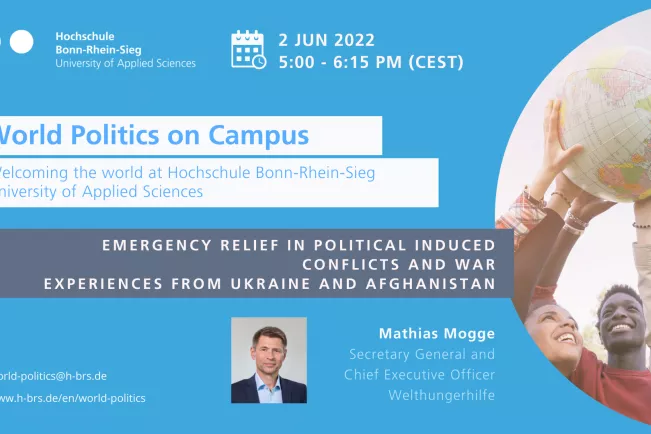
Mathias Mogge was elected Secretary General/Chief Executive Officer of Welthungerhilfe in September 2018. He is an agricultural engineer and environmental scientist (MSc) who has worked for the organization in various positions since 1998, most recently as Chief Program Officer since March 2010. From 2005 to 2010, he was in charge of the "Knowledge, Innovation, Consulting" department. From 2001 to 2005, as Regional Director in Bamako (Mali), he was responsible for the development and management of programs in Mali, Burkina Faso, Liberia and Sierra Leone. Prior to that, as Country Group Spokesperson and Program Manager, he oversaw Welthungerhilfe's programs in Uganda, Ethiopia and Sudan from 1998 to 2001.
Mathias Mogge has also been Chairman of the Board of the Association of German Development and Humanitarian Organisations (VENRO) since December 2021. (VENRO), of which he has been a member of the honorary board since 2013. Since 2018, he has also been a member of the board of trustees of the Aid by Trade Foundation.
On 2 June, he will hold a keynote on Emergency Relief in political induced conflicts and war: Experiences from Ukraine and Afghanistan. International and National NGOs work to an increasing extend in violent, fast changing and challenging environments. The lecture will discuss principles and practical approaches towards delivering immediate assistance and longer term support.
12 May 2022: Egypt as an anchor of stability and peace in the middle East
Keynote Speaker: H. E. Khaled Galal Abdelhamid, Ambassador of the Arab Republic of Egypt to the Federal Republic of Germany
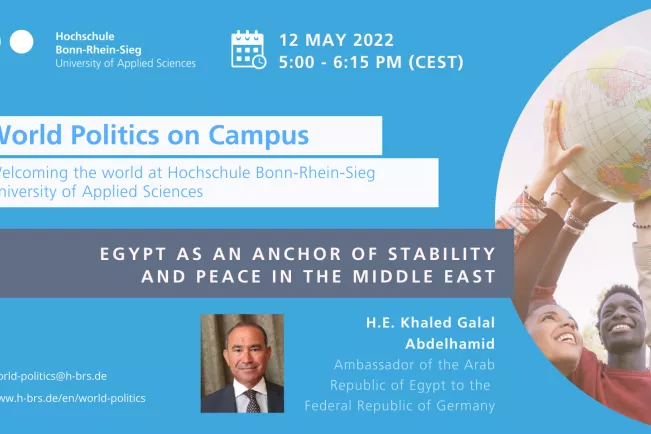
The Middle East is witnessing unprecedented and overwhelming challenges recently, with wide-scale military and humanitarian crises in Libya, Syria and Yemen. Egypt is a stabilizing force in its region, contributing to security and stability. Germany is a reliable partner in these endeavors. Examples of Egyptian – German cooperation are numerous, including the Munich Format on Middle East Peace Process and Berlin Process on Libya.
Ambassador Abdelhamid is a career diplomat with diverse diplomatic experiences. His career in the Ministry of Foreign Affairs of Egypt included serving as Assistant Foreign Minister, Chief of Cabinet from 2017 to 2019, while his service as a UN staff member had him occupy positions such as the Special Assistant to the Executive Secretary of the Comprehensive Nuclear-Test-Ban Treaty Organization (CTBTO, Vienna) from 2008 to 2016. Ambassador Abdelhamid has been designated Ambassador to Germany since October 2019.
On 12 May, he hold a keynote on Egypt as an anchor of stability and peace in the middle East.
5 May 2022: Climate negotiations - the marathon from Berlin to Sharm-el-Sheikh
Keynote Speaker: Jochen Flasbarth, State Secretary at the Federal Ministry of Economic Cooperation and Development (BMZ)
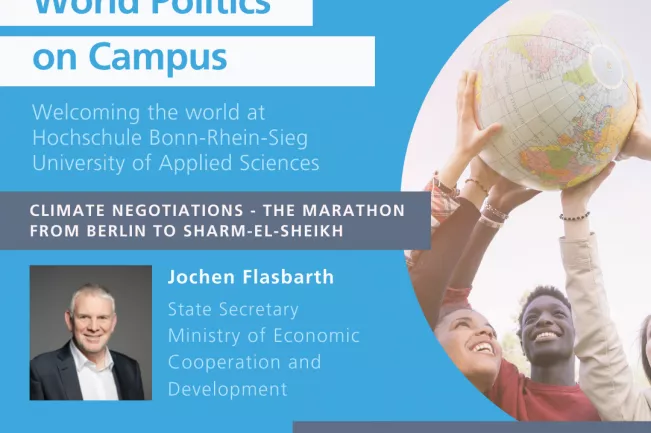
Jochen Flasbarth took office as State Secretary at the Federal Ministry for Economic Cooperation and Development in December 2021. From 2013 to 2021, he was State Secretary at the Federal Ministry for the Environment, Nature Conservation and Nuclear Safety. Prior to that, he held the position of President of the Federal Environment Agency for four years. He holds a degree in economics from the Universities of Münster and Bonn.
On 5 May, he will hold a keynote on Climate negotiations - the marathon from Berlin to Sharm-El-Sheikh.
20 Jan 2022: Mexico's policies for sustainability: a new social and environmental approach
Keynote Speaker: H. E. Francisco Quiroga, Ambassador of Mexico to the Federal Republic of Germany
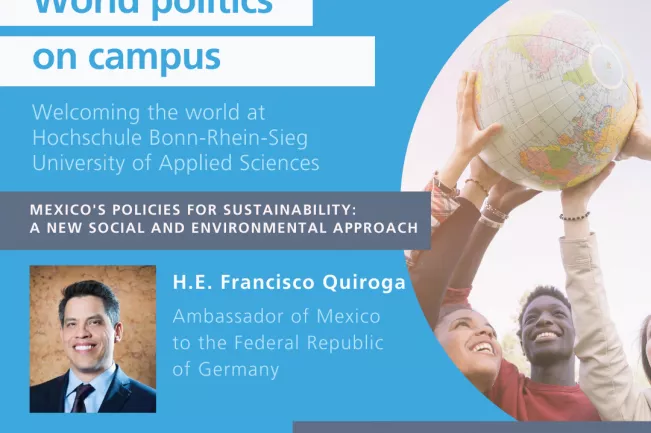
Mexico is a megadiverse country, the 15th economy of the world, and the 10th most populated State; a member of the OECD and G20. It is also a middle-income country, urged to tackle the profound economic and social inequalities that affect our society. Against this background, the Mexican government deploys policies to face those challenges. In parallel, the country continues its commitment with the global community to follow its path towards sustainability by adopting an approach that conciliates the domestic and international social and economic demands with the environmental imperative.
H. E. Francisco Quiroga is Ambassador of Mexico to the Federal Republic of Germany since September 2021. During his professional career, Francisco Quiroga has worked in the public sector in Mexico and in the private sector in Mexico and Germany. He began his career in the International Trade Department of the Mexican Ministry of Trade and Industrial Promotion (now Ministry of Economy). In the private sector, he has held management positions and worked for companies in the steel sector, dealing with issues related to international trade, global value chain development, logistics and financing, among others.
Francisco Quiroga graduated from the Universidad Autónoma de Nuevo León, Mexico, with a degree in economics and earned two master's degrees: from Yale University in International Business and Development and from the University of Auckland, New Zealand, in Operations Management.
9 Dec 2021: COP 26: What we needed, what we got ,and what's next!
Keynote Speaker: Dr Ani Dasgupta, President and CEO of World Resources Institute
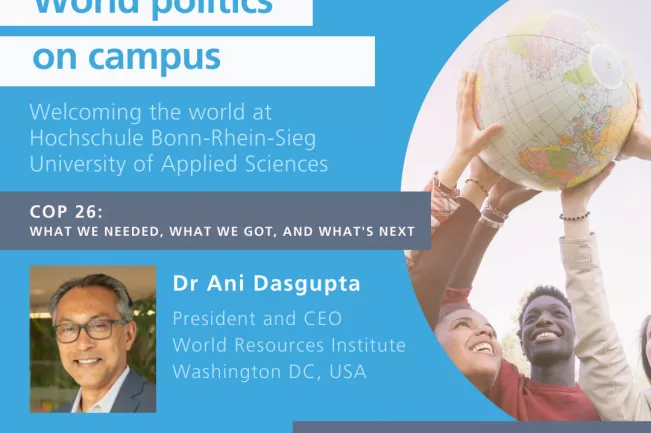
COP 26 was a critical moment to keep the Paris Agreement goal of limiting global temperature rise to 1.5C, and to protect biodiversity and nature. It was a time to rebuild trust in global solidarity and deliver on promises made and show plans to go further on climate ambition, finance, adaptation, and protecting nature. Ani Dasgupta, President & CEO of World Resources Institute, will discuss what were the successes, and where we need to go further in this decisive decade for climate action.
Dr Ani Dasgupta is President and CEO of World Resources Institute, where he works to advance the institute’s global vision to improve the lives of all people and ensure that nature can thrive. A widely recognized leader in the areas of sustainable cities, urban design and poverty alleviation, he developed his expertise in positions ranging from nonprofits in India to the World Bank, where he developed the Bank’s first Knowledge strategy. He took the helm at WRI after seven years as Global Director of WRI’s Ross Center for Sustainable Cities.
28 Oct 2021: The current situation in Afghanistan
Keynote Speaker: Dr Jasper Wieck, Special Representative of the Federal Government for Afghanistan and Pakistan
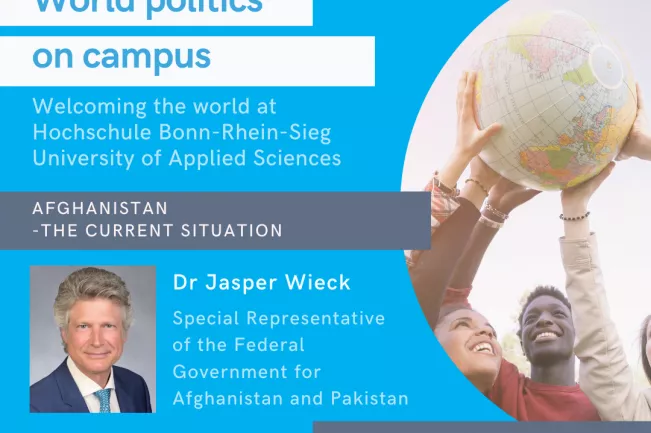
Over the past twenty years, the international community has been heavily involved in Afghanistan. This is particularly true of Germany, which has not only been one of the main troop contributors, but has also invested considerable resources in the stabilization and socio-economic development of the country, as well as in the intra-Afghan peace process. In August, the Afghan government collapsed and the Taliban took control of the entire country.
Two and a half months after the fall of Kabul, what is the current situation in Afghanistan? What do we expect in the coming months? What are our interests with respect to Afghanistan? How can we ensure that our interests are taken into account? Is the international community united on Afghanistan?
Dr Jasper Wieck has extensive experience in the region and served as Deputy Chief of Mission in India (2017-2020) and Deputy Director General for East Asia, Southeast Asia, and the Pacific (2020/2021). From 2012 to 2017, Dr. Wieck was Head of Division for Security and Defense Policy at the German Foreign Office. Prior to that, he served in the German delegation to NATO and in the German embassies in Moscow and Baku, among others.
14 Oct 2021: Hunger and nutrition during and after the corona-crisis
Keynote Speaker: Dominik Ziller, Vice-President of the International Fund for Agricultural Development (IFAD)
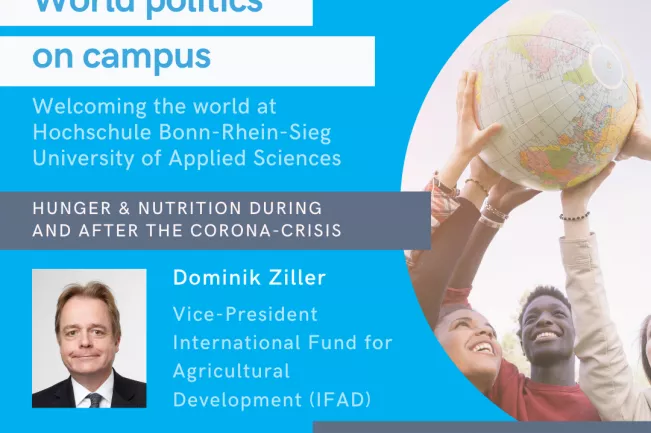
One in ten people worldwide were hungry in 2020. Moreover, one in three people did not have access to adequate food. Previous progress to reduce undernourishment has stalled in the past five years. While the COVID-19 pandemic has exacerbated this trend and a sharp surge was observed in the midst of the pandemic, the underlying factors are multi-fold: conflict, climate variability and extremes, economic slowdowns and downturns, as well as public debt and reduced fiscal space. Unless bold actions are taken, the world will not be on track to end hunger and malnutrition in all its forms by 2030.
The International Fund for Agricultural Development (IFAD), which has been investing in the inclusive and sustainable transformation of rural areas since 1978, employs a food systems approach. Therefore, IFAD focusses on interactions among underlying factors of hunger, malnutrition and poverty, identifies entry points for interventions, and helps countries to set up food systems that provide decent livelihoods for those who work in them.
1 Jul 2021: EU-MERCOSUR Trade Agreement
Keynote Speakers: H.E. Roberto Jaguaribe, Ambassador of Brazil to the Federal Republic of Germany
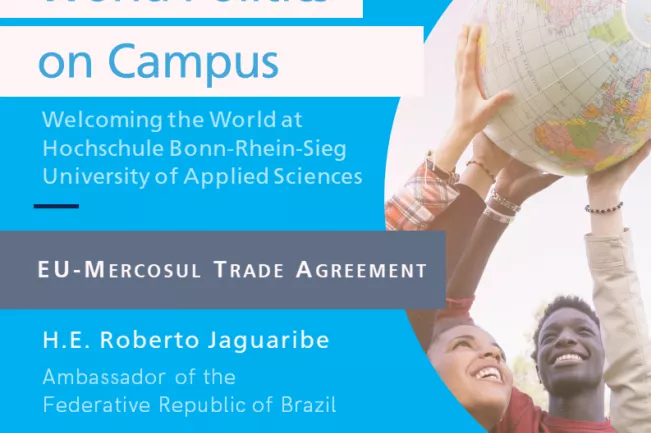
H.E. Roberto Jaguaribe, Ambassador of Brazil, was our distinguished guest on 1 July 2021. He gave a lecture with focus, among other things, on the free trade agreement between the EU and Mercosur (Portuguese: Mercosul).
17 Jun 2021: Fair and Equitable International Supply Chains
Keynote Speaker: Dr Maria Flachsbarth, Parliamentary State Secretary to the German Federal Minister of Economic Cooperation and Development (BMZ)
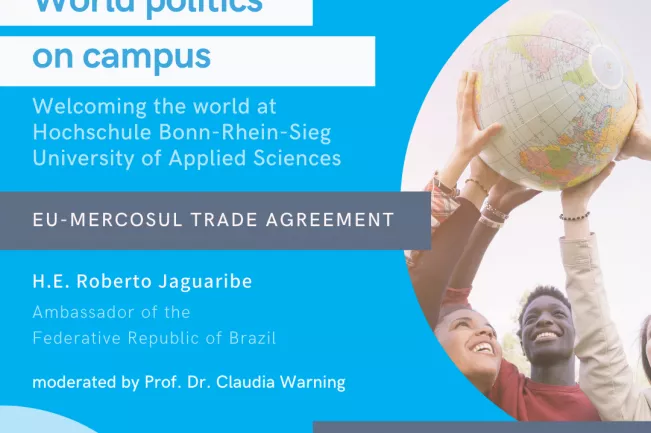
Dr Maria Flachsbarth, Parliamentary State Secretary of the German Federal Ministry of Economic Cooperation and Development (BMZ) was our distinguished guest on 17 June 2021. She gave a guest lecture on fair and equitable international supply chains.
The online talk & discussion was moderated by Prof. Dr. Claudia Warning.
Digital International General Studies (DISG)
